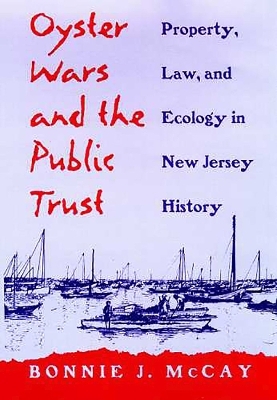
Oyster Wars and the Public Trust
Property, Law, and Ecology in New Jersey History
Seiten
1998
University of Arizona Press (Verlag)
978-0-8165-1804-3 (ISBN)
University of Arizona Press (Verlag)
978-0-8165-1804-3 (ISBN)
- Titel z.Zt. nicht lieferbar
- Versandkostenfrei innerhalb Deutschlands
- Auch auf Rechnung
- Verfügbarkeit in der Filiale vor Ort prüfen
- Artikel merken
Who owns tidal waters? Are oyster beds common holdings or private property? Questions first raised in colonial New Jersey helped shape American law by giving rise to the public trust doctrine. Today that concept plays a critical role in public advocacy and environmental law. Bonnie McCay now puts that doctrine in perspective by tracing the history of attempts to defend common resources against privatization. She tells of conflicts in New Jersey communities over the last two centuries: how fishermen dependent on common-use rights employed poaching, piracy, and test cases to protect their stake in tidal resources, and how oyster planters whose businesses depended on the enclosure of marine commons engineered test cases of their own to seek protection for their claims. McCay presents some of the most significant cases relating to fishing and waterfront development, describing how the oyster wars were fought on the waters and in the courtrooms and how the public trust doctrine was sometimes reinterpreted to support private interests. She explores the events and people behind the proceedings and addresses the legal, social, and ecological issues these cases represent.
Oyster Wars and the Public Trust is an important study of contested property rights from an anthropological perspective that also addresses significant issues in political ecology, institutional economics, environmental history, and the evolution of law. It contributes to our understanding of how competing claims to resources have evolved in the United States and shows that making nature a commodity remains a moral problem even in a market-driven economy.
Oyster Wars and the Public Trust is an important study of contested property rights from an anthropological perspective that also addresses significant issues in political ecology, institutional economics, environmental history, and the evolution of law. It contributes to our understanding of how competing claims to resources have evolved in the United States and shows that making nature a commodity remains a moral problem even in a market-driven economy.
Bonnie J. McCay is a professor of anthropology and ecology at Rutgers University.
| Erscheint lt. Verlag | 30.3.1998 |
|---|---|
| Verlagsort | Tucson |
| Sprache | englisch |
| Gewicht | 591 g |
| Themenwelt | Geschichte ► Teilgebiete der Geschichte ► Militärgeschichte |
| Recht / Steuern ► EU / Internationales Recht | |
| Recht / Steuern ► Öffentliches Recht ► Umweltrecht | |
| Recht / Steuern ► Rechtsgeschichte | |
| ISBN-10 | 0-8165-1804-1 / 0816518041 |
| ISBN-13 | 978-0-8165-1804-3 / 9780816518043 |
| Zustand | Neuware |
| Haben Sie eine Frage zum Produkt? |
Mehr entdecken
aus dem Bereich
aus dem Bereich
neueste Manipulationstechniken als Waffengattung der NATO
Buch | Softcover (2023)
Westend (Verlag)
24,00 €


